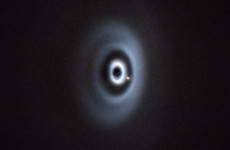Science
Researchers Discover New Proto-Planet WISPIT 2b in Milky Way

Astronomers from the University of Galway have made a significant breakthrough in the field of astrophysics with the discovery of a new proto-planet named WISPIT 2b. This planet, estimated to be around 5 million years old, is located approximately 430 light years from Earth within our Milky Way galaxy. The discovery, published in the Astrophysical Journal Letters, underscores the collaborative efforts of an international research team, co-led by the University of Galway and Leiden University in the Netherlands, with additional contributions from the University of Arizona in the United States.
One of the remarkable aspects of WISPIT 2b is its status as a young planet still in the early stages of formation. Its discovery was somewhat unexpected, according to Dr Christian Ginski, a lecturer at the University of Galway’s School of Natural Sciences. The planet was detected at the European Southern Observatory’s Very Large Telescope (ESO’s VLT) in the Atacama Desert, Chile, where it appears as a small dot situated between a young sun similar to our own and a multi-ringed dust disk surrounding it.
“The moment we observed this multi-ringed disk, we recognized the potential to detect a planet within it, prompting us to request immediate follow-up observations,” Dr Ginski explained. WISPIT 2b was captured in near-infrared light, akin to the view one would see using night-vision goggles, showcasing its lingering heat from the formation phase.
Insights into Planet Formation
Researchers believe that WISPIT 2b offers a unique opportunity to study the planet formation process. Dr Ginski praised the contributions of the students involved in the research, emphasizing their role in advancing astrophysics. “We are fortunate to have these remarkable young researchers on the team. This is the next generation of astrophysicists, and I am confident they will make more groundbreaking discoveries in the future,” he stated.
PhD student Chloe Lawlor, who specializes in astrophysics, expressed her excitement about participating in such a pivotal discovery. She described the experience as “incredibly fortunate” and potentially career-defining. Similarly, Jake Byrne, an MSc student also specializing in astrophysics at the University of Galway, shared his disbelief when he first saw the image of WISPIT 2b. “Contributing to something this impactful, and collaborating with international peers, is precisely the kind of opportunity that early-career researchers like Chloe, Dan, and I aspire to,” he remarked.
Fellow MSc student Dan McLachlan reflected on the experience, noting, “In my time working in astronomy, it is easy to focus on minute tasks while losing sight of the larger picture. When you step back and consider the enormity of what you are involved in, it can be truly overwhelming.”
The discovery of WISPIT 2b not only enriches our understanding of planetary formation but also highlights the vital role of collaborative research in the scientific community. As the study of WISPIT 2b progresses, it promises to unveil further insights into the cosmos and the origins of planetary systems.
-

 Top Stories3 months ago
Top Stories3 months agoTributes Surge for 9-Year-Old Leon Briody After Cancer Battle
-

 Entertainment4 months ago
Entertainment4 months agoAimee Osbourne Joins Family for Emotional Tribute to Ozzy
-

 Politics4 months ago
Politics4 months agoDanny Healy-Rae Considers Complaint After Altercation with Garda
-

 Top Stories4 months ago
Top Stories4 months agoIreland Enjoys Summer Heat as Hurricane Erin Approaches Atlantic
-

 World5 months ago
World5 months agoHawaii Commemorates 80 Years Since Hiroshima Bombing with Ceremony
-

 Top Stories3 months ago
Top Stories3 months agoNewcastle West Woman Patricia Foley Found Safe After Urgent Search
-

 Top Stories5 months ago
Top Stories5 months agoFianna Fáil TDs Urgently Consider Maire Geoghegan-Quinn for Presidency
-

 World5 months ago
World5 months agoCouple Convicted of Murdering Two-Year-Old Grandson in Wales
-

 World5 months ago
World5 months agoGaza Aid Distribution Tragedy: 20 Killed Amid Ongoing Violence
-

 World5 months ago
World5 months agoAristocrat Constance Marten and Partner Convicted of Infant Murder
-

 Top Stories4 months ago
Top Stories4 months agoClimbing Errigal: A Must-Do Summer Adventure in Donegal
-

 Top Stories4 months ago
Top Stories4 months agoHike Donegal’s Errigal Mountain NOW for Unforgettable Summer Views









